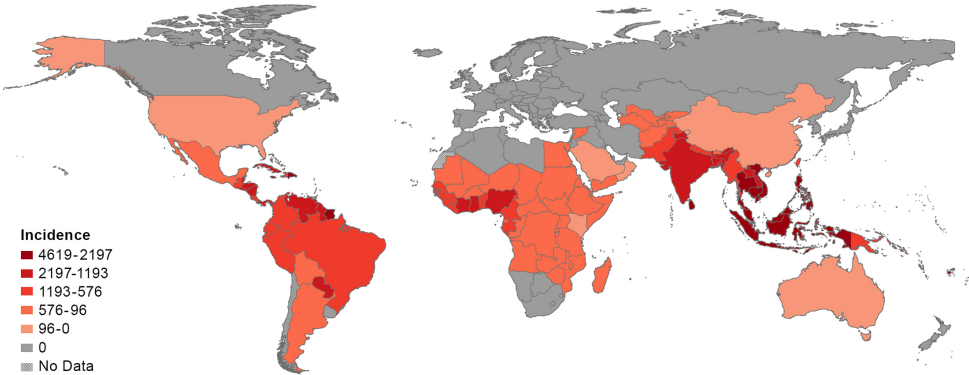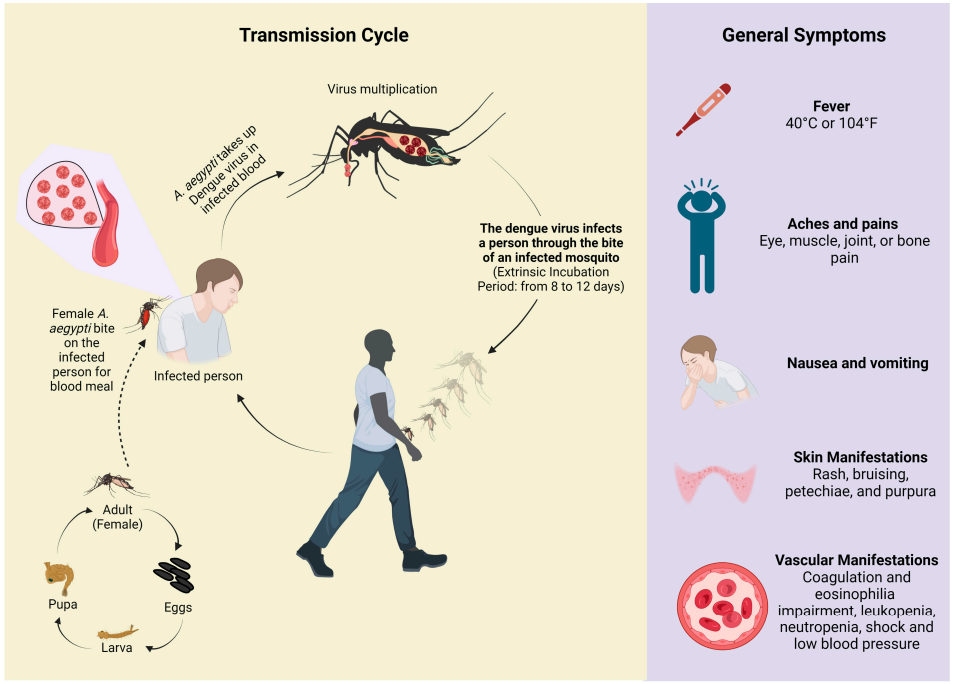Creative Biolabs is a professional and famous provider of antibody products and customized antibody development services. Especially, we offer high-quality in vitro diagnostic (IVD) antibody development services using our advanced platforms and technologies. Our services target various biomarkers of different diseases. Here, we introduce our IVD antibody development services for Dengue of tropical infectious disease.
Introduction of Dengue
Dengue is an arthropod-borne viral disease which is transmitted by Aedes mosquitoes. It is caused by four dengue virus serotypes (DENV 1, DENV 2, DENV 3 and DENV 4) and was first isolated in 1943. The four phylogenetically and antigenically distinct dengue viruses, although infected by one type confers long-term immunity, it is to that type only and not to the other three. Early spread and identified typing of dengue virus belongs to a member of the Flavivirus genus, correlated with other medically essential arboviruses including yellow fever and Japanese encephalitis viruses.
 Fig.1 Global dengue incidence per 100,000 person-years in 2013.1
Fig.1 Global dengue incidence per 100,000 person-years in 2013.1
Since the 1950s, dengue has progressively emerged as a global problem. It is widely endemic in more than 100 countries of Africa, the Americas, the southeast Asia, the western Pacific, and the eastern Mediterranean regions. The incidence of dengue has been reported to be increased 30-fold in the past fifties years. Recent investigation estimated in 2013 that 390 million people have suffered from dengue viruses with 96 million cases each year worldwide, is three times than World Health Organization’s estimation in 2012. However, the real disease burden is not well known, particularly in Indonesia, India, Brazil, and China. The key factors to facilitate the spread of dengue are global phenomena, such as urbanization or international travel.
The Pathogenesis of Dengue
Dengue viruses spread rapidly within countries and across regions resulting in a rising frequency of epidemics dengue disease. The dengue has increasingly evolved from a sporadic illness to a major public health problem owing to the extensive geographical range, increased number of cases and disease severity. The pathophysiological basis for this severe dengue is complicatedly multifactorial. Protective versus pathological outcome relies on the balance between the host genetic and immunological background, and virus factors.
 Fig.2 Overview of the dengue transmission cycle and the main symptoms related to the disease.2
Fig.2 Overview of the dengue transmission cycle and the main symptoms related to the disease.2
Dengue provides the most abundant demonstration in human medicine and the greatest human disease burden induced by the phenomenon that is intrinsic antibody-dependent infection enhancement. This immunopathological infection of macrophages or monocytes using infectious immune complexes can suppress innate antiviral systems, allowing the logarithmic intracellular growth of dengue virus. The DENV 1-4 dengue viruses are evolved from a common ancestor yet retain analogous ecology and pathogenicity. Despite infection with one virus leading to cross-protection against the infection of a different type, millions of secondary dengue infections occur around the world annually. When individuals are infected in the virtual absence of cross-protective dengue antibodies, the dengue vascular permeability syndrome may ensue. This event happens in approximately 2-4% of second heterotypic dengue infections.
Treatments
Nowadays, dengue is considered as the most prevalently spreading mosquito-borne viral disease in human beings. In primary infections, anti-dengue virus IgG develops relatively slowly, with low titers 8-10 days after the fever begins, whereas anti-dengue-virus IgM is typically detectable about 5 days after fever and lasting 2 to 3 months. In secondary infections, anti-dengue-virus IgG evolves rapidly, with high concentrations soon after fever onset. In certain cases, anti-dengue-virus IgM cannot be detected. Therefore, the development of multivalent vaccines for dengue is being hampered by difficulties in the induction of a balanced immune response.
There are no specific antiviral agents existing for dengue and not yet any vaccines to prevent infections from dengue virus. The infected patients should be suggested to stay well hydrated and to avoid aspirin, namely acetylsalicylic acid, aspirin-containing drugs, and other nonsteroidal anti-inflammatory drugs (e.g. Ibuprofen) due to their anticoagulant properties. Fever ought to be controlled with acetaminophen and tepid sponge baths. Febrile sicks are supposed to escape mosquito bites to reduce the further transmission. Notably, the most effective protection against dengue disease is the measure to avoid mosquito bites. Once infected by viruses, the early recognition and prompt supportive treatment can lower the risk of medical complications and death substantially.
Creative Biolabs is devoted to the development of antibodies for research, diagnostic, and therapeutic applications. IVD antibodies are extensively used in immunodiagnostic tools for disease screening and therapeutic monitoring. Through our role as a leading antibody service provider, Creative Biolabs is well-positioned to develop high-quality CD20-specific antibodies. Besides antibody generation, Creative Biolabs also offers diagnostic immunoassay development services, including feasibility analysis, assay design, assay protocol establishment, assay optimization, and kit production.
Creative Biolabs has successfully completed numerous IVD antibody generation and development projects for clients across the globe. If you are interested in our IVD antibody discovery services, please contact us for more details.
References
- Herricks, Jennifer R., et al. "The global burden of disease study 2013: What does it mean for the NTDs?." PLoS neglected tropical diseases 11.8 (2017): e0005424. Distributed under Open Access license CC BY 4.0, without modification.
- Lessa, Carlos Letacio Silveira, et al. "Dengue as a disease threatening global health: A narrative review focusing on Latin America and Brazil." Tropical Medicine and Infectious Disease 8.5 (2023): 241. Distributed under Open Access license CC BY 4.0, without modification.
For Research Use Only.